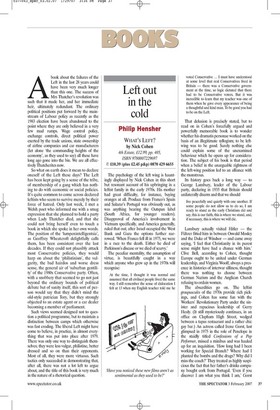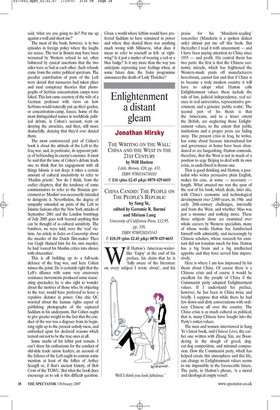Left out in the cold
Philip Hensher WHAT'S LEFT?
by Nick Cohen 4th Estate, £12.99, pp. 405, ISBN 9780007229697 £1039 (plus £2.45 p&p) 0870 429 6655 Abook about the failures of the Left in the last 28 years could have been very much longer than this one. The success of Mrs Thatcher's revolution was such that it made her, and her immediate heir, ultimately redundant. The ordinary political positions put forward by the mainstream of Labour policy as recently as the 1983 election have been abandoned to the point where they are only believed in a very few mad rumps. Wage control policy, exchange controls, direct political power exerted by the trade unions, state ownership of airline companies and car manufacturers (let alone `the commanding heights of the economy', as they used to say) all these have long ago gone into the bin. We are all effectively Thatcherites now.
So what on earth does it mean to declare oneself of the Left these days? The Left has been kept going by a sense of the tribe, of membership of a gang which has nothing to do with economic or social policies. It's quite common to come across declared leftists who seem to survive merely by their force of hatred. Only last week, I met a Welsh poet who informed me with a smug expression that she planned to hold a party when Lady Thatcher died, and that she could not bring herself even to touch a book in which she spoke in her own words. The position of the `lumpenintelligentsia', as Geoffrey Wheatcroft delightfully calls them, has been consistent over the last decades. If they could not plausibly attack most Conservative policies, they would harp on about the `philistinism', the vulgarity, the bad hairdos and worse dress sense, the general air of 'suburban gentility' of the 1980s Conservative party. Often, with a snobbery that seemed to go not just beyond the ordinary bounds of political debate but of sanity itself, this sort of person would say that they didn't mind the old-style patrician Tory, but they strongly objected to an estate agent or a car dealer becoming a member of parliament.
Such views seemed designed not to question a political programme, but to maintain a distinction between camps which otherwise was fast eroding. The liberal Left might have come to believe, in practice, in almost everything that was put into place after 1979. There was only one way to distinguish themselves; they were less vulgar, philistine, better dressed and so on than their opponents. Most of all, they were more virtuous. Such tactics only succeeded in demonstrating that, after all, there was not a lot left to argue about, and the title of this book is very much in the nature of a rhetorical question.
The psychology of the left wing is hauntingly displayed by Nick Cohen in this short but resonant account of his upbringing in a leftist family in the early 1970s. His mother had great difficulty, for instance, buying oranges at all. Produce from Franco's Spain and Salazar's Portugal was obviously out, as was anything bearing the Outspan label (South Africa, for younger readers). Disapproval of America's involvement in Vietnam specifically, and America generally, ruled that out; after Israel occupied the West Bank and Gaza the options further narrowed. 'When Franco fell ill in 1975, we were in a race to the death. Either he died of Parkinson's disease or we died of scurvy.'
The peculiar mentality, the assumption of virtue, is beautifully caught in a way which anyone who grew up in the 1970s will recognise: At the time, I thought it was normal and assumed that all civilised people lived the same way. I still remember the sense of dislocation I felt at 13 when my English teacher told me he voted Conservative ... I must have understood at some level that real Conservatives lived in Britain — there was a Conservative government at the time, so logic dictated that there had to be Conservative voters. But it was incredible to learn that my teacher was one of them when he gave every appearance of being a thoughtful and kind man. To be good you had to be on the Left.
That delusion is precisely stated, but to read on in Cohen's forcefully argued and powerfully memorable book is to wonder whether his dramatis personae worked on the basis of an illegitimate syllogism; to be leftwing was to be good. Surely nothing else could explain some of the unexamined behaviour which he opens up for consideration. The subject of his book is that period when a belief in the unarguable rightness of the left-wing position led to an alliance with the monstrous.
Its history goes back a long way — to George Lansbury, leader of the Labour party, declaring in 1935 that Britain should unilaterally disarm and that we should live peacefully and quietly with one another. If some people do not allow us to do so, I am ready to stand as the early Christians did and say, this is our faith, this is where we stand, and, if necessary, this is where we will die.
Lansbury actually visited Hitler — the Fiihrer fitted him in between Oswald Mosley and the Duke of Windsor — and came away saying, 'I feel that Christianity in its purest sense might have had a chance with him' Clive Bell, according to Cohen, thought Europe ought to be united under German leadership, and Virginia Woolf, always a presence in histories of interwar silliness, thought there was nothing to choose between German Nazism and the Anglican Church refusing to ordain women.
The absurdities go on. The leftist groupuscules of the 1970s provide rich pickings, and Cohen has some fun with the Workers' Revolutionary Party under the sinister and rapacious leadership of Gerry Healy. (It still mysteriously continues, in an office on Clapham High Street, wedged between a tapas restaurant and a rather chic gay bar.) An actress called Irene Gorst, last glimpsed in 1975 in the role of Penelope in the staidly titled Confessions of a Pop Performer, missed a minibus and was hauled up for an inquisition. 'How long had I been working for Special Branch? Where had I planted the bombs and the drugs? Why did I miss the coach?' They treated as highly suspicious the fact that her father's drinks company bought cork from Portugal. 'Even if you discover I am what you think I am,' Gorst said, 'what are you going to do? Put me up against a wall and shoot me?'
The meat of the book, however, is in two episodes in foreign policy where the laughs are scarce. The war in Bosnia may have been worsened by Western refusal to act, often bolstered by cynical assertions that the two sides were as bad as each other. Such refusals came from the entire political spectrum. The peculiar contribution of parts of the Left were denial that massacres had taken place and mad conspiracy theories that photographs of Serbian concentration camps were faked. This last came courtesy of the wife of a German professor with views on how Serbians would naturally put up their garden, or concentration-camp, fences. Some of the most distinguished names in worldwide political debate, in Cohen's account, went on denying the atrocities, and then, still more shamefully, denying that they'd ever denied them.
The most controversial part of Cohen's book is about the attitude of the Left to the Iraq war, and, in particular, its apparent policy of befriending its enemy's enemies. It must be said that the tone of Cohen's debate leads one to think that his engagement with all things Islamic is not deep; it takes a certain amount of cultural insensitivity to refer to 'Muslim priests'. Nor do I think, from the earlier chapters, that the tendency of some commentators to refer to the Bosnian government as 'Muslim' was necessarily intended to denigrate it. Nevertheless, the degree of sympathy extended on parts of the Left to Islamic factions after the New York attacks of September 2001 and the London bombings of July 2005 goes well beyond anything that can be thought of as cultural sensitivity. The bombers, we were told, were the 'real' victims. An article in Index on Censorship about the murder of the Dutch film-maker Theo van Gogh blamed him for his own murder; he had 'roared his Muslim critics into silence with obscenities'.
This is all building up to a full-scale defence of the Iraq war, and here Cohen misses the point. He is certainly right that the Left's alliance with some very unsavoury resistance movements produced some nauseating spectacles; he is also right to wonder about the motives of those who, by objecting to the war, would have preferred to leave a repulsive dictator in power. One chic QC worried about the human rights aspect of publishing photographs of the captured Saddam in his underpants. But Cohen ought to give greater weight to the fact that the conduct of the war was a disgrace from its beginning right up to the present unholy mess, and embarked upon for declared reasons which turned out not to be the true ones at all.
Some marks of his leftist past remain. I can't share his enthusiasm for the conduct of old-style trade union leaders; an account of the failures of the Left ought to contain some mention at least of the follies of Arthur Scargill or, if that's ancient history, of Bob Crow of the TGWU. But what the book does encourage us to ask is this difficult question.
Given a world where leftists would have preferred Saddam to have remained in power and where they denied there was anything much wrong with Milosevic, what does it mean to refer to yourself as leftor rightwing? Is it just a matter of wearing a red or a blue badge? Is it any more than the way you anticipate expressing your feelings when, at some future date, the Today programme announces the death of Lady Thatcher?





















































 Previous page
Previous page